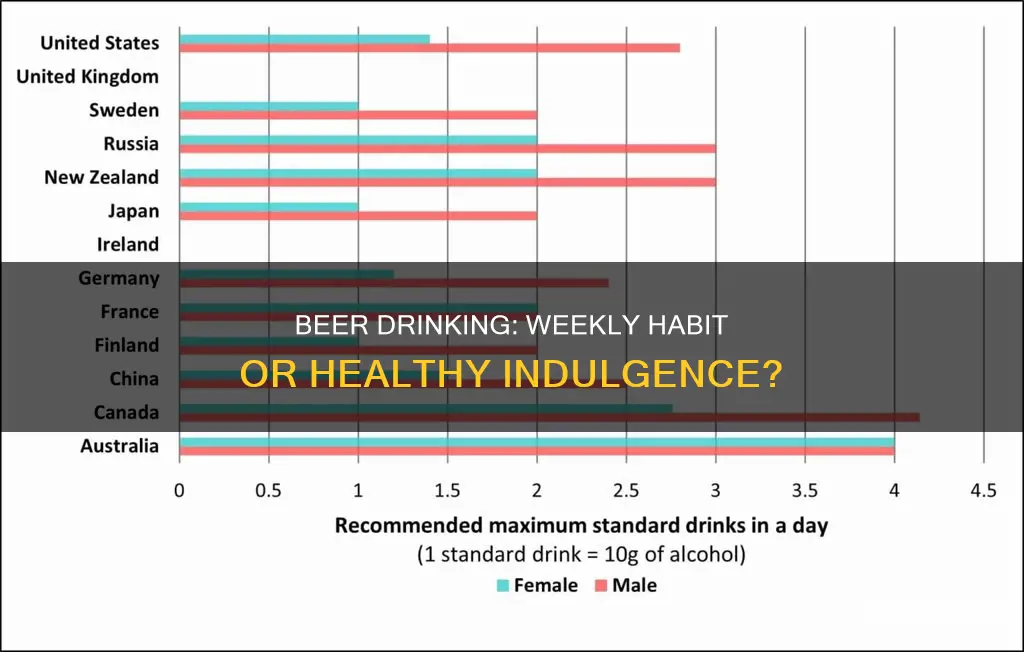
Beer is a popular alcoholic drink, but is it okay to drink it every week? Alcohol is a drug, and drinking it, especially in large amounts, can have serious negative health consequences. These include an increased risk of early death, alcohol dependence, depression, liver disease, weight gain, and cancers. However, some studies suggest that light to moderate drinking may have potential health benefits, such as improved heart health, blood sugar control, stronger bones, and reduced dementia risk. So, is it okay to drink beer once a week? The answer may depend on various factors, including the amount consumed, individual health, and other lifestyle choices. While moderate drinking may provide some benefits, excessive drinking can lead to harmful consequences. As such, it is essential to consume alcohol in moderation and follow guidelines provided by health organizations.
| Characteristics | Values |
|---|---|
| Health Benefits | May aid your bone density |
| May improve blood sugar control | |
| May lower dementia risk | |
| May benefit your heart | |
| Negative Effects | Dehydration |
| Disrupted sleep | |
| Weight gain | |
| Alcohol dependence | |
| Increased risk of depression | |
| Liver disease | |
| Increased risk of death | |
| Increased risk of cancer | |
| Digestive issues |
What You'll Learn

Beer's impact on bone density
A 2009 study published in the American Journal of Clinical Nutrition found that men who consumed one to two drinks of beer or alcohol daily had higher bone mineral density than non-drinking men. Similarly, postmenopausal women who consumed one to two drinks per day had higher bone mineral density in the spine and hip area than non-drinking women. The study concluded that the positive association between bone density and beer or wine consumption may be due to constituents other than ethanol, such as silicon in beer and phenolic compounds in wine.
However, a 2018 Korean study found that heavy drinking was associated with lower bone mineral density. Additionally, a 2016 Indian study reported that the prevalence of osteopenia and osteoporosis was higher among individuals with alcoholic liver disease.
It is important to note that the relationship between alcohol consumption and bone health is complex and may depend on various factors such as age, gender, and drinking patterns. While moderate drinking may have some benefits, heavy drinking can negatively impact bone health and increase the risk of osteoporosis.
Antibiotics and Alcohol: Is Beer Safe During Treatment?
You may want to see also

Sleep disruption
Drinking beer, even in light amounts, can negatively impact your sleep. Alcohol can affect the brain's communication pathway and its ability to process information. It can slow down reflexes and impair balance, memory, and sleep.
A 2018 study published in JMIR Mental Health found that even light drinkers (defined as two or fewer servings for men and one or fewer for women) experienced a 9.3% decrease in sleep quality. When you consume alcohol, your liver metabolises it, which can result in a night of poor sleep.
Consuming alcohol before bed can lead to frequent wakings and low-quality sleep. It can cause you to experience more deep sleep and less REM sleep initially. Later in the night, once your body has metabolised the alcohol, you may experience a rise in the lightest stage of sleep, leading to fragmented sleep.
Alcohol can also disrupt your sleep by interfering with your circadian rhythm. It may decrease the body's sensitivity to cues like daylight and darkness, which trigger shifts in body temperature and the secretion of the sleep hormone melatonin. This can result in you feeling alert when you want to sleep and sleepy when you want to be awake.
Experts recommend avoiding alcohol at least three to four hours before bed.
Beer Before Bed: A Good Night's Sleep?
You may want to see also

Weight loss
Drinking beer once a week is unlikely to have a significant impact on weight loss, but it's important to consider the number of calories in beer and how it can affect your overall calorie intake and nutritional goals.
Beer is often referred to as "empty calories" because it provides little to no nutrients while contributing a significant number of calories. The specific number of calories in a beer depends on its alcohol content, with higher alcohol by volume (ABV) beers generally containing more calories. For example, a regular Budweiser contains about 40% more calories than a Bud Light.
If you're aiming to lose weight, it's essential to maintain a caloric deficit, which means consuming fewer calories than you burn. Beer can make this challenging because it provides calories without satisfying hunger, and drinking alcohol can even stop the process of fat burning. Additionally, drinking beer can negatively impact your sleep quality, leading to weight gain and muscle loss. It can also inhibit self-control, making it harder to stick to your dietary and fitness goals.
To incorporate beer into your weight loss plan, consider the following strategies:
- Limit the number of beers you drink per week. The fewer beers you consume, the fewer empty calories you ingest.
- Choose light or low % ABV beers. These options tend to have fewer calories.
- Reduce your portion size. Opt for a smaller glass or a 12-ounce can instead of a 16-ounce bottle.
- Drink less frequently. For example, you could restrict your beer consumption to weekends only.
- If you're cutting carbs, opt for lower-carb beers like Michelob Ultra, Budweiser Select 55, or Corona Premier.
- Adjust your eating habits when drinking beer. Choose lean protein sources and vegetables instead of high-calorie, high-carb foods.
- Be mindful of the calories in your beer and track them accurately, especially if you're logging your food intake.
In conclusion, while it's not advisable to drink beer daily when trying to lose weight, having a beer once a week is unlikely to hinder your progress significantly. However, it's important to be mindful of the number of calories in beer and how it fits into your overall nutritional goals. Combining these strategies with a healthy diet and regular exercise will help you achieve your weight loss goals while still enjoying an occasional beer.
UTI and Beer: Is It Safe to Drink?
You may want to see also

Digestive issues
Drinking beer once a week can still cause digestive issues for some people. Alcohol is a drug, and it can irritate the gut, including the stomach. Beer, like other alcoholic drinks, can cause acid reflux, heartburn, and gastritis (inflammation of the stomach lining). These issues can lead to abdominal pain, bloating, and diarrhea.
Alcohol can also affect the speed at which food moves through the body, which can cause abdominal pain, bloating, and diarrhea. In addition, alcohol inhibits the absorption of nutrients in the small intestine and can contribute to malnutrition and weight loss.
Some people may be allergic or intolerant to beer, experiencing symptoms such as brain fog, fatigue, inflammation, anxiety, bloating, diarrhea, and swollen eyes. These symptoms can be a sign that the body is rejecting beer, and it may be advisable to switch to gluten-free drinks or avoid alcohol altogether.
It is important to note that the effects of alcohol on digestion can vary depending on the amount consumed, individual factors, and whether the drinker has food in their stomach. However, even a single episode of heavy drinking can cause digestive issues. To protect gut health and keep health risks low, it is recommended to follow low-risk drinking guidelines, such as not drinking more than 14 units a week and having several drink-free days.
Parking Garage Beer Drinking: Is It Legal?
You may want to see also

Risk of chronic diseases
Drinking beer once a week is generally considered light to moderate drinking. While light to moderate drinking may have some health benefits, heavy drinking increases the risk of chronic diseases. Here are some of the risks of chronic diseases associated with heavy drinking:
- Cardiovascular Diseases: Heavy drinking is a risk factor for cardiovascular diseases such as coronary heart disease, heart failure, stroke, and peripheral vascular disease. It can increase the risk of high blood pressure, stroke, heart failure, and cardiomyopathy. The risk of cardiovascular diseases is also influenced by drinking patterns, with binge drinking increasing the risk of ischemic heart disease.
- Cancer: Heavy drinking is a well-established risk factor for various types of cancer, including cancers of the upper aero-digestive tract (mouth, pharynx, larynx, and esophagus), liver, colorectum, and female breast. The risk of cancer is also influenced by drinking patterns, with binge drinking increasing the risk of oral cancer.
- Diabetes: Heavy drinking increases the risk of type 2 diabetes mellitus and can trigger its development by impairing glucose tolerance, altering peptide signalling involved in appetite regulation, and causing dysfunction and apoptosis of pancreatic β-cells.
- Obesity: Heavy drinking is a major cause of obesity and can lead to increased abdominal obesity, especially in men. It can also interfere with satiety mechanisms and increase appetite, contributing to weight gain.
- Other Chronic Diseases: Heavy drinking is associated with an increased risk of chronic pancreatitis, gout, epilepsy, and immune system dysfunction. It can also cause or exacerbate mental health issues such as depression and dementia.
Beer and Hep C: Safe Drinking After Recovery?
You may want to see also
Frequently asked questions
Drinking beer once a week is generally considered light drinking, which some studies suggest may have a slightly lower risk of death compared to abstaining from alcohol. However, it's important to note that the health effects of drinking beer are mixed, and excessive drinking can lead to negative health consequences.
Heavy and binge drinking are associated with an increased risk of early death, alcohol dependence, depression, liver disease, weight gain, and certain types of cancer.
Light to moderate beer intake may be associated with a lower risk of heart disease, improved blood sugar control, stronger bones, and reduced dementia risk. Beer also contains some vitamins and minerals, such as B vitamins, potassium, calcium, thiamine, iron, and zinc.
In the United States, the weekly "upper limits" for healthy adults are four drinks in one day or 14 per week for men, and three drinks in one day or seven per week for women. Drinking more than these amounts is considered "heavy" or "at-risk" drinking.
Yes, you should avoid drinking beer or any type of alcohol if you are planning to drive or operate machinery, taking medications that interact with alcohol, living with a medical condition that could be worsened by alcohol, or pregnant or trying to become pregnant.







